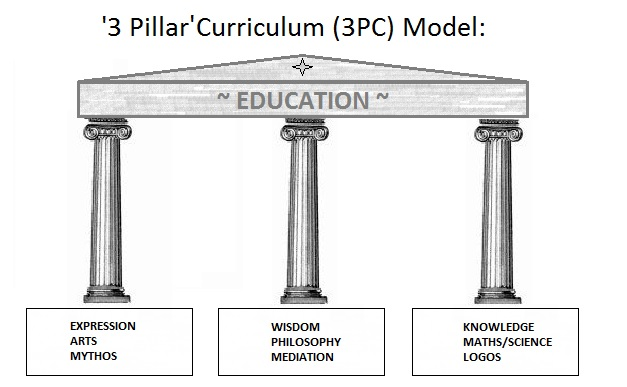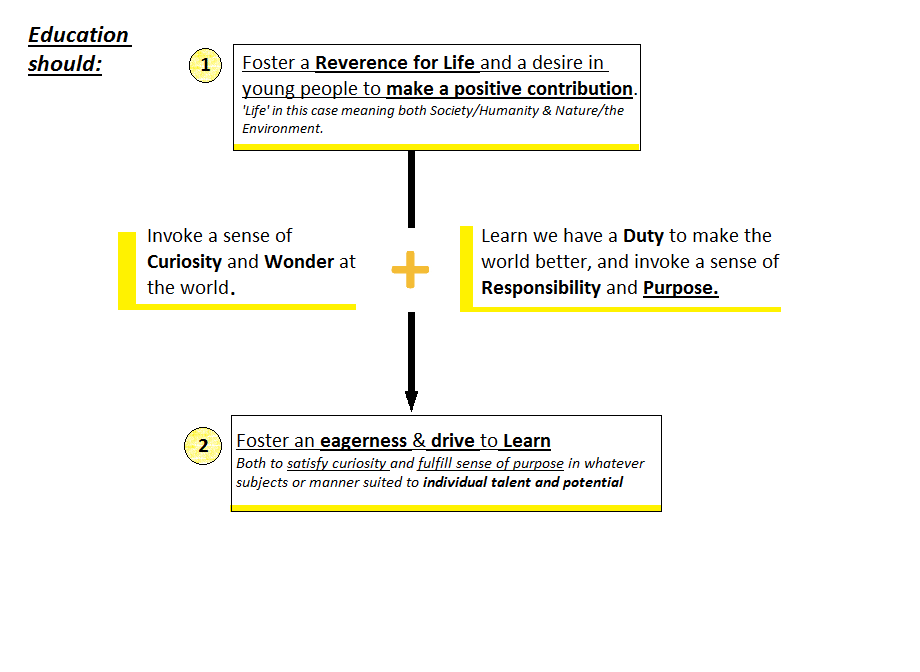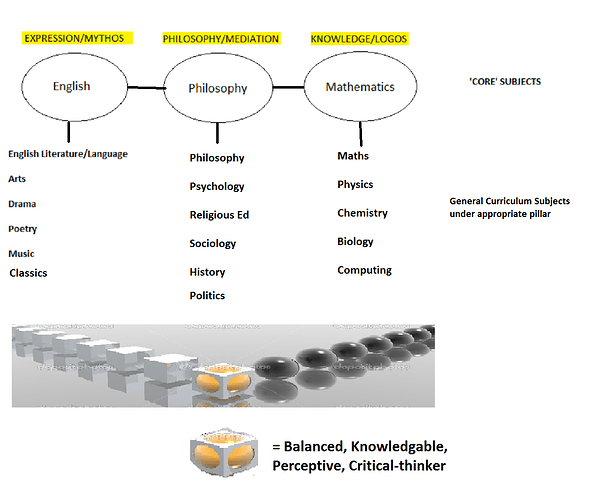Hi Everyone,
I’m guesing folks dont read half of those ‘Introduce yourself’ posts but on there I recently said hello and mentioned that Education was the big thing for me and the area I’d like to particularly help with and that I’d be starting a thread soon. Its quite a long one and there may be some repetition so sorry for any of that.
So to start with I want to lay out what this post will entail. The main point is to present my vision of a reformed school curriculum, which I am calling the Three-Pillar Curriculum Model (or 3PCM), based around the addition of Philosophy to the national curriculum and it joining the two current ‘Core Subjects’ of English and Maths.
I guess some of you will be thinking ‘Thats great and all- but where does it fit with Meritocracy and how does it help us get in Government?’ I suppose, strictly speaking it’s nothing to do with UKMP, and this is something I will be working on regardless of anything else that’s going on, politically or otherwise. But I also think that our aims are closely alligned. Meritocracy is about letting reason and knowledge guide us, and empowering voters to be a part of that progress, am I right @Roberto? . At the moment our whole culture, but particularly our education system develops only a narrow brand of intelligence that serves only to get good grades, get a degree, get a job, earn money, buy a house, buy things, have kids, repeat. Like most of us here will have noticed, people arent awake, they’re either easily manipulated by media or distracted and apathetic to politics, happy to just take care of things in their own little bubbles of comfort; no one is looking at the bigger picture. But imagine an educaiton system that not only strives for excellence in achievement and knowledge-attainment (aka merit) but also produces perceptive, thoughtful, politically aware, WISE young people who actively seek to contribute to the world in the best way they can. Arent these the educated minds we want voting in our Democracy. Wouldnt products of such a system naturally lean toward meritocratic ideals?
I’d like to emphasise that this model is in the earliest of stages of it’s development, I havnt had a lot of time to do huge amounts of research yet and so apologies for coming to you with something that maybe seems really basic and far from completion. I was thinking of keeping it to myself for the time being as I was worried about it being taken and used or warped into something else by others, but I think that to share it at this point may end up being massively beneficial in terms of the suggestions the community may be able to give. I also recently read Plato’s ‘Republic’ and Socrates’ words on Just men not competiting with one another struck a chord!
I must also stress that while the general concept is pretty much unchangeable to my mind, all the details I have proposed are just rough guides and estimates, so while I am happy for suggestions, at this stage please don’t get too bogged down in the finer details - there will be a time for that later on.
Anyway, here goes:
The basic idea as mentioned is to incorporate Philosophy into the national curriculum as a core subject. I think the need for some wisdom in society is pretty evident and so I wont get into the ‘why’ right now so much as the ‘what’. So, Philosophy as a core subject. That’s the basic starting point, but by core subject what I really mean is it needs to be one of the ‘pillars’ of education. Most of what we learn at school in the UK I have grouped loosely into Expression and Knowledge. Stuff like the arts and creative pursuits, and stuff like your maths and sciences. I propose that a central, mediating pillar - Wisdom - should be created. There is a current surge in PSHCE/PD type lessons, particularly in the wake of recent acts of terrorism and ‘radicalization’ but the fact is that these lessons, which aren’t done regularly, barely even scratch the surface of what you can call ‘personal development’. 90% of it is just ‘say no to drugs’, ‘wear a condom’ etc. There’s barely any genuine philosophizing involved. So I’m not talking about glorifying PHSCE. There’s room for that stuff, sure. But what I’m talking about here is a pillar of education that is a grand synthesis of Philosophy, Psychology, Sociology, Religious Ed (*which I also think needs massive reform), History and Politics. I wont get into the finer details of lesson content here, though I’d be happy to discuss some time, but for peace of mind I’m not talking about reading Kant or whatever to a bunch of 8-year olds. It will be age specific and more related to a ‘community of enquiry’, very much about letting kids think for themselves and come up with their own solutions to the question of central concern: “how ought we live?”
Below are a few basic diagrams I put together.
Vision for the Purpose of Education
’3 Pillars’ Curriculum Model

Basic 3 Pillar Model shown above in Temple Diagram.
More detailed expansion of it below, relating to what each pillar represents.
As I mentioned earlier, these are just early thoughts and the finer details aren’t what I’m worried about right now. Some subjects may be in the wrong pillar, some you may not be able to choose a pillar, some I have excluded because I wasn’t sure where to put them etc. I get that ‘Logos’ could easily be the title of the philosophy pillar, for example, rather than the maths one, but I don’t want to get too caught up in terminology here
One thing to remember is that the pillars are not intended to be separate entities, they should sometimes dovetail. I have thought of plenty of examples of this that I will be happy to share if people want some but for the sake of space I wont go into it in this post.
In terms of imagery, I think the temple is quite a powerful symbol for education and learning, and I’m pretty happy with that but suggestions are always welcome. A tree was the only other one I considered as growth imagery etc.
Though this isn’t really touched upon in the model yet, I also think that (within its limits) pupil choice is a massive factor to incorporate and pupils being able to direct their own learning and follow their natural curiosity will be hugely beneficial in fostering a love of learning and help develop meritorious young people.
So, lastly, what do I want from you guys?
-
Any suggestions, or constructive criticism on the idea itself.
-
Any suggestions for research?
I’ve looked quite heavily into “P4C” (Philosophy for Children) as a base for early years lesson content in particular, and I’m currently looking at how I can link it with Carol Dweck’s ‘Growth-Mindset’ (and how this mirrors Nietzche’s ‘Overman’?) -
Current thoughts on where the meritocracy party stands on education content and if and how I may be able to have some input.
(@HelenBacchus did I see you write about Montesori education somewhere? I’m pretty unfamiliar with this but is it something like the Steiner Schools? If so I think they could potentially be compatible, particularly with regard to fostering a reverence for life.) -
Suggestions on where to begin in getting this noticed within the education system, as I am clueless in this respect. (I am thinking of doing some kind of research-masters in education and incorporating this into a thesis of some kind, though I’m not sure how beneficial this would be and it’s a lot of money and time wasted if the wrong avenue)
-
Any questions about any aspect of all this, more details, clarifications, specifics etc
Thanks for taking the time to read all this and I hope its been clear, not too repetitive, and that you feel it hasn’t been time wasted.


